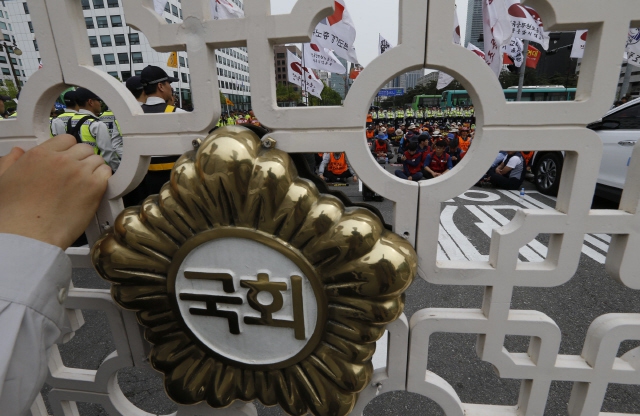 |
|
Members of the Korean Confederation of Trade Unions (KCTU) gather outside the National Assembly in Seoul’s Yeouido neighborhood in opposition to “changing the public pension for the worse” on May 6, 2015 (Hankyoreh archive)
|
Assembly and Demonstration Act to be amended to allow assemblies
The Constitutional Court issued a decision finding provisions in the Assembly and Demonstration Act barring assemblies and demonstrations within 100 meters of the National Assembly building to be in violation of the Constitution. The act in question is expected to be amended to allow assemblies and demonstrations near the National Assembly as well. On May 31, the Constitutional Court issued a unanimous decision finding Article 11-1 of the Assembly and Demonstration Act unconstitutional. The provision was the subject of a constitutional appeal submitted by members of the Korean Government Employees' Union (KGEU) and Korean Teachers’ and Education Workers’ Union (KTU) indicted on charges related to assemblies and demonstrations around the National Assembly to oppose “changing the public pension for the worse.” Following this decision, the National Assembly will be required to amend the law by Dec. 31, 2019, to allow assemblies and demonstrations near the building; if it fails to do so, the provisions in question will become null and void as of Jan. 1, 2020. The Assembly and Demonstration Act bars assemblies and demonstrations within 100 meters of the outer boundaries of the National Assembly building, the Constitutional Court, and other course, with violations punishable by fines or jail time. “Because assemblies can only effectively express the opinions of the multitude when they take place in settings with particularly symbolic meaning or a special connection to the assembly, the right to choose an assembly site is integral to the right to assembly,” the Constitutional Court said. “Even when the particularity and importance of the National Assembly are taken into account, restrictions on assembly sites near the National Assembly building should be kept to the necessary minimum,” it added. The court went on to stress that “excessive constraints on freedom of assembly must be reduced in cases where there is little likelihood of the National Assembly’s Constitutional function in terms of ‘reflecting the public will’ being compromised by an assembly or demonstration.” “A uniform, full-scale ban without exceptions even for assemblies in which no concrete threat exists is an excessive restriction that goes beyond the necessary scope,” it concluded. At the same time, the Constitutional Court did call on the National Assembly to establish concrete standards for permission and prohibition. “In terms of the ban on assemblies near the National Assembly, the legitimacy of the legislative goal of protecting the National Assembly’s Constitutional functions is recognized,” the court said. “It is preferable to leave the matter of what forms of assemblies to grant exceptions for to the legislators’ judgment.” By Yeo Hyeon-ho, senior staff writer Please direct comments or questions to [english@hani.co.kr]






